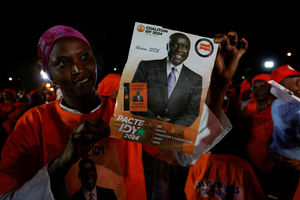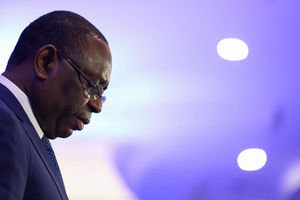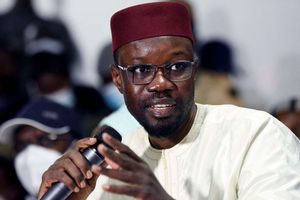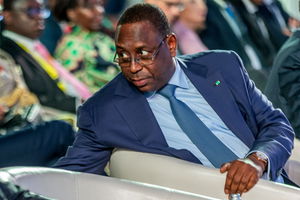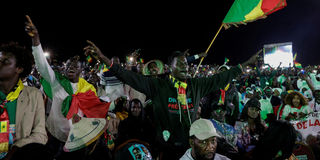
Supporters of Senegalese opposition leader Ousmane Sonko and Bassirou Diomaye Faye, the presidential candidate, during the final campaign rally in Mbour, on March 22, 2024.
The list of candidates in Senegal’s much-anticipated presidential election rapidly shrunk as the country headed for Sunday’s vote.
Yet the world may still be watching how this election pans out for a country that nearly plunged into chaos over a poll date.
Candidates with weaker chances of winning withdrew from the contest to endorse those with the higher chances, in their own estimation.
The approved list had 19 candidates, including former Prime Ministers and former Mayors.
But two of them have been making the most headlines, increasingly pointing to a possible two-horse race in the March 24 poll.
They are Amadou Ba, the candidate of the ‘Benno Bokk Yakaar’ coalition that includes the ruling Alliance of the Republic party, and a perceived underdog, Bassirou Diomaye Faye, who is drawing his support from the disbanded PASTEF party of firebrand politician, Ousmane Sonko.
Until a few weeks ago, Faye was in a jail cell, facing trial over alleged incitement of insurrection.
He was among scores of people who were released through an amnesty following the national political dialogue that ended weeks of chaos prompted by outgoing President Macky Sall’s controversial decision to postpone the election which was initially scheduled for February 25.
The Constitutional Council reversed President Sall’s pronouncement, paving way for the conduct of the poll this week.
It has been a roller-coaster campaign for the candidates and their supporters, as the election falls in an unusual period - Ramadan, when most Senegalese are largely inactive.
Over 97 per cent of the country’s over 17 million population identify as Muslim.
A major part of the problem that led to the constitutional crisis that sparked the protests was the disqualification of scores of heavyweight candidates, among them Sonko. His party and his supporters were key drivers of protests that rocked Senegal in the last two years.
Sonko was serving a two-year sentence for corrupting the youth since July 2023, in connection to a case of alleged rape.
But he was barred from running due to a separate case involving defamation charges against a government minister.
Sonko was also released from jail as part of the amnesty. But he couldn’t regain his place on the ballot.
His party, The African Patriots of Senegal for Work, Ethics and Fraternity, known best by its French acronym, PASTEF, also remains disbanded.
But even though his face is not on the ballot box, the former tax inspector is hugely influencing the process. He has thrown his weight behind Faye, who is his protégé and the party’s sponsored candidate.
Both men worked together as tax inspectors, when they built their relationship that turned them into political allies.
Faye, who turns 44 this week, was Secretary General of PASTEF. He was the party’s Plan B. But he is not well known as Sonko, whose popularity he is banking on. And it appears to have been paying off.
He is vying under a hastily created platform called ‘Diomaye for President Coalition Party.’
Faye was selected after the Constitutional Council issued its final list. He had been in jail since April 2023 awaiting trial on charges of defamation and spreading fake news, for comments he made on social media.
There is a third major contender – former Dakar Mayor Khalifa Ababacar Sall, who has no relations with the president. He has also been getting supports from other smaller candidates.
But Faye and Ba have been the biggest beneficiaries of the spree of cross-carpeting.
Faye got three of his biggest endorsements this week. On Friday, Karim Wade, son of former President Abdoulaye Wade, whose candidacy was also rejected by the Constitutional Council, formally announced his support for him.
On Thursday, it was another political heavyweight Habib Sy who withdrew from the race and threw his support behind Faye. That came a day after his endorsement by Cheikh Tidiane Dièye, another heavyweight.
Like many candidates who have expressed support for Faye, Habib is a long-time supporter of Sonko who has given an altogether different meaning to the race. He is particularly popular among the young, unemployed Senegalese for promising radical reforms.
Sonko came in third in the 2019 presidential election with 15% of the vote. He has since beefed up his support base, especially in the last two years, while championing anti-establishment crusades.
He is particularly endearing to the younger generation, which constitute the largest single voting bloc, through his constant speaking against graft.
Sonko’s appeal to his supporters and sympathisers also has to do with his stance on France-Senegal relations.
Analysts say Faye shares these same views if not more extreme ones. The latter has, for instance, reportedly said during campaigns that he would replace the France-controlled West African single currency – CFA franc – which is pegged to the Euro.
The due has also vowed to renegotiate the country's mining and energy contracts. These two sectors hold huge promises for Senegal’s economy in the coming years.
Amadou Ba, on the other hand, is campaigning on the platform of continuity. The 62-year-old served as Senegal's Finance Minister, them Foreign minister, before been appointed Prime Minister, a position held until 6 March, when he resigned on the request of President Sall to focus on his campaign.
But there have been reports suggesting a fallout between Sall and Ba, his hand-picked candidate. And this is linked to rumours of an unlikely collusion between Sall and Sonko.
Sonko has suddenly diverted all his attention to Mr Ba, who happens to be his former boss as Tax Inspector. He accused him of masterminding all his ordeals in the last one year.
"We must not give in to emotion and we should not fight the wrong battle. Senegal still needs the wisdom of Macky Sall, and Amadou Ba is far worse than Macky Sall," Sonko told his supporters at a campaign rally for Faye in his stronghold of Ziguinchor in the southern region of the country.
Ba’s nomination by Sall caused division within the ruling party. The former Prime Minister’s campaign has sometimes appeared to distance him from his former boss.
In one of his most critical statements yet, he promised that once elected he would work to detach the office of President of the Republic from the position of party leader.
"A government must go beyond partisanship," he said in a TV interview.
"The President of the Republic must be above the fray and I intend to rid him of the day-to-day management of the party," he added.
Over seven million eligible Senegalese voters have been cleared to cast their ballot in what will see the country’s fourth peaceful power transition.
For the ordinary voters, a lot of issues are at stake, but key among them are the economy and the country’s future with its influential former colonial master, France.
For any candidate to be declared winner in the first round, they must get more than 50 per cent of the vote. Going by previous experience, this is not likely to be decided in a one-round vote.
And that will mean Ababacar Sall and the 4th big-name candidate, Idrissa Seck, himself a former Prime Minister, will become kingmakers.
If the votes go to the second round, it will be held on March 31st, two days before the outgoing President is expected to step down on April 2nd.
Macky Sall was hailed during his first term as an example of democrats in a continent plagued by undemocratic rulers.
But his second term was characterized by events that tainted Senegal’s image as one of Africa’s most stable democracies. They included restrictions on civil liberties, a ban on demonstrations and internet shutdowns.
According to Human Rights Watch, at least 40 people were killed and more than a thousand political opponents jailed since 2021, when tension began emerging over Sall’s suspected intention to prolong his stay in power.
Internet watchdogs have warned of the possibility of another shutdown.
Surfshark, a brand of VPN services, said its Internet Shutdown Tracker revealed that the country was at risk of government-imposed internet restrictions.
The organisation recorded seven cases of shutdown in the last year alone. The restrictions targeted social media platforms X, Facebook, YouTube, Instagram, Telegram, Whatsapp, TikTok, as well as overall internet connectivity. The move was meant to prevent protesters from organizing and coordinating.
“Senegal’s troubling past of internet restrictions speaks volumes. The frequency at which they have been imposed and the circumstances surrounding them show that the country is not yet prepared for democratic elections. Instead of hearing out its citizens, the government chooses to silence them in times of political unrest,” says Lina Survila, a spokeswoman for Surfshark.

